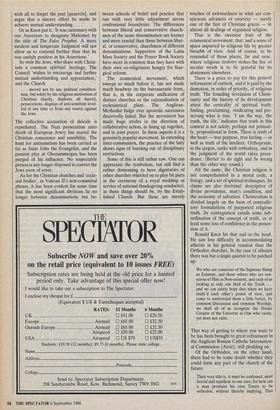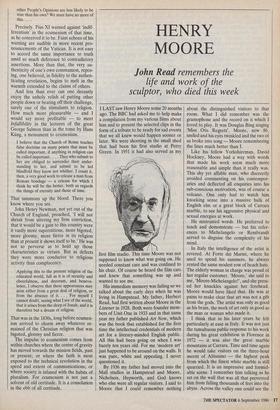with all to forget the past [quarrels], and urges that
a sincere effort be made to achieve mutual understanding. . .
Or as Knox put it, 'It was customary with our Ancestors to designate Mahomet by the title of The False Prophet. A more modern and temperate Judgment will not allow us to contend further than that he was unduly positive in his Assertions.'
So with the Jews, who share with Christ- ians a common spiritual heritage. The Council 'wishes to encourage and further mutual understanding and appreciation,' and the Church . . . moved not by any political considera- tion, but solely by the religious motivation of Christian charity, deplores all hatred, persecutions, displays of anti-semitism level- led at any time or from any source against the Jews.
The collective accusation of deicide is repudiated. The Nazi persecution unto death of European Jewry has seared the Christian conscience and sensibility. The hunt for antisemitism has been carried as far as Saint John the Evangelist, and the passion play at Oberammergau has been purged of his influence. No respectable person is any longer disposed to convict the Jews even of error.
As for the Christian churches and `eccle- sial bodies', in Vatican II's non-committal phrase, it has been evident for some time that the most significant divisions lie no longer between denominations but be- tween schools of belief and practice that run with very little adjustment across confessional boundaries. The differences between liberal and conservative church- men of the same denomination are keener and more crucial than those between liber- al, or conservative, churchmen of different denominations. Supporters of the Latin Mass Society and the Prayer Book Society have more in common than they have with their own co-religionists hungry for litur- gical reform.
The ecumenical movement, which sweeps so much before it, has not made much headway on the bureaucratic front, that is, in the corporate unification of distinct churches or the rationalisation of ecclesiastical plant. The Anglican- Methodist fudge over apostolic succession deservedly failed. But the movement has made huge strides in the direction of collaborative action, in lining up together, and in joint prayer. In these aspects it is a genuinely popular movement. In extending inter-communion, the practice of the laity shows signs of bursting out of disciplinary restrictions.
Some of this is still rather raw. One can appreciate the symbolism, but still find it rather demeaning to have dignitaries of other churches wheeled on to play bit parts in the ceremony of a royal wedding or service of national thanksgiving conducted, as these things should be, by the Estab- lished Church. But these are merely
touches of awkwardness in what are con- spicuous advances of courtesy — surely one of -the first of Christian graces — in almost all dealings of organised religion.
That is the sweetest fruit of the ecumenical movement; that, and a sense of space imparted to religious life by greater breadth of view. And of course, to be reminded of those places, far and near, where religious zealotry stokes the fire of secular wrath is to be grateful for its abatement elsewhere.
There is a price to pay for this general reformaton of outlook, and it is paid by the demotion, in order of priority, of religious truth. The founding revelation of Christ- ianity and the history of its development attest the centrality of spiritual truth: finding, proclaiming, vindicating and pre- serving what is true. 'I am the way, the truth, the life,' indicates that truth in this context is not solely, perhaps not primari- ly, propositional in form. There is truth of the heart — true purpose, true feeling — as well as truth of the intellect. Orthopraxis, in the jargon, ranks with orthodoxy, and in the judgment of the world takes prece- dence. (Better to do right and be wrong than the other way round.) All the same, the Christian religion is not comprehended in a moral code, a liturgy, and a set of spiritual techniques. Its claims are also doctrinal: descriptive of divine providence, man's condition, and the economy of salvation. Christendom is divided largely on the basis of contradic- tory formulations of purported religious truth. Its reintegration entails some sub- ordination of the concept of truth, or at least some loss of confidence in the posses- sion of it.
Ronald Knox hit that nail on the head. He saw less difficulty in accommodating atheists in his general reunion than the Orthodox churches. In the case of atheists there was but a single quarrel to be patched up: We who are conscious of the Supreme Being as Existent, and those others who are con- scious of Him as Non-existent, and each of us looking at only one Half of the Truth. . and we can surely hope that when we have study'd each other's points of view, and come to understand them a little better, by common Discussion and common Worship, we shall all of us recognize the Divine Creator of the Universe as One who exists, yet does not exist.
That way of getting to where you want to be has been brought to great refinement in the Anglican Roman Catholic Internation- al Commission (Arcic), still plodding on.
Of the Orthodox, on the other hand, there had to be some doubt whether they could form any part of the church of the future.
Their very title is, it must be confessed, most horrid and repellent to our ears; for how can a man proclaim his own Tenets to be orthodox, without thereby implying, That
other People's Opinions are less likely to be true than his own? We must have no more of this. . . .
Precisely. Pius XI warned against 'indif- ferentism' in the ecumenism of that time, as he conceived it to be. Faint echoes of his warning are audible in more recent pro- nouncements of the Vatican. It is not easy to accord the same importance to truth amid so much deference to contradictory assertions. More than that, the very au- thenticity of one's own communion, repos- ing, one believed, in fidelity to the authen- ticating revelation, begins to melt in the warmth extended to the claims of others.
And less than ever can one decently enjoy the unholy relish of putting other people down or beating off their challenge, surely one of the stimulants to religion. How much more pleasurable — and I would say more profitable — to meet Infallibility in the lectures of the great George Salmon than in the tome by Hans Kung, a monument to ecumenism.
I believe that the Church of Rome teaches false doctrine on many points that must be called important, if anything in religion can be called important. . . . They who submit to her are obliged to surrender their under- standing to her, and submit to be led blindfold they know not whither. I count it, then, a very good work to release a man from Roman bondage — a release for- which 1 think he will be the better, both as regards the things of eternity and those of time.
That summons up the blood. There you know where you are.
John Henry Newman, not yet out of the Church of England, preached, 'I will not shrink from uttering my firm, conviction, that it would be a gain to this country were it vastly more superstitious, more bigoted, more gloomy, more fierce in its religion than at present it shows itself to be.' He was not so perverse as to hold up those characteristics as virtues. But as defects they were more conducive to religious activity than complacency.
Applying this to the present religion of the educated world, full as it is of security and cheerfulness, and decorum, and benevo- lence, I observe that these appearances may arise either from a great deal of religion, or from the absence of it. . . . For myself I cannot doubt, seeing what I see of the world, that it arises from the sleep of Jonah; and it is therefore but a dream of religion.
That was in the 1830s, long before ecumen- ism arrived to charm away whatever re- mained of the Christian religion that was bigoted, gloomy and fierce.
The impulse to ecumenism comes from within churches where the centre of gravity has moved towards the mission fields, past or present; or where the faith is most exposed to the technical revolution in the speed and extent of communications; or where society is infused with the habits of pluralism. For ecumenism is not just a solvent of old certitude. It is a consolation in the ebb of all certitude.







































 Previous page
Previous page